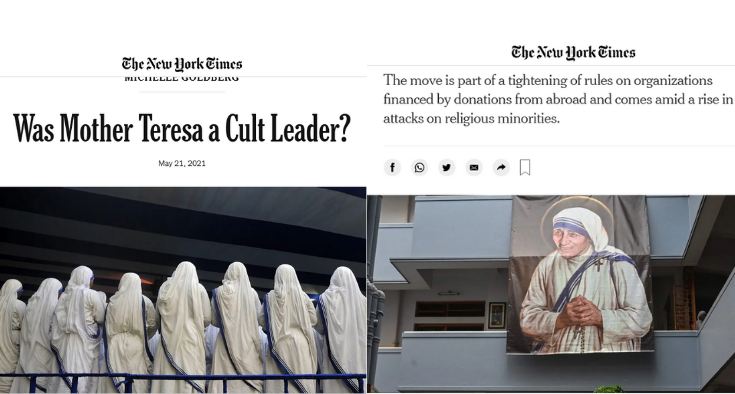The Union Ministry of Home Affairs has refused to renew the FCRA license of the Missionaries of Charity (MoC) that was founded in 1950 by Anjezë Gonxhe Bojaxhiu, or Mother Teresa, after receiving what it said were “adverse inputs”. The outrage in the global media following this incident isn’t surprising.
VOA reported, “India’s move to block the flow of foreign funds to the Missionaries of Charity comes amid a pushback by right-wing Hindu nationalists who accuse Christian missionaries of converting Hindus against their will or by offering bribes.” [use the hyperlink]. Al Jazeera went a lot further. It has tweeted, “India freezes Mother Teresa charity’s accounts amid hate attacks.” But this is fake news. MoC itself clarified that the Centre had not frozen its bank accounts.
India freezes Mother Teresa charity’s accounts amid hate attacks https://t.co/nLD5VOxDkk pic.twitter.com/Hb8DPgUzAq
— Al Jazeera English (@AJEnglish) December 27, 2021
Yet, Al Jazeera and VOA reports would seem like harmless rhetoric, if you consider what NYT has done.
NYT embarrasses itself
An angry NYT has reported, “India Cuts Off Foreign Funding of Mother Teresa’s Charity.” The left-liberal media outlet insinuated, “The move is part of a tightening of rules on organizations financed by donations from abroad and comes amid a rise in attacks on religious minorities.”
What NYT perhaps did not realise is that only in May 2021, it had published an opinion piece titled, “Was Mother Teresa a Cult Leader?”
The opinion piece is unforgiving in Teresa’s criticism. But NYT also had to bash the Modi government. So, in a matter of seven months, you have two stories on the same media house- one opinion piece questioning if Teresa was a cult leader, and another story criticising the Modi government for refusing to renew the license of Teresa’s charity.
NYT opinion article recounted Teresa’s criticism
Interestingly, the opinion piece in NYT recounted some of the harshest criticisms of Teresa by Aroup Chatterjee, a British Indian doctor and author who had worked as a doctor in India in the 1970s and 1980s. It also mentioned observations by Christopher Hitchens, who collaborated with writer and filmmaker Tariq Ali on a short documentary, Hell’s Angel, one of the first criticisms against Teresa.
It was spearheaded by one of the volunteers in Teresa’s missionary work. It critiqued the sanitation of the soup houses and hospices heavily. Using eyewitness accounts, it claimed that there was no regard for the safety of terminally ill individuals. The claim was reaffirmed in the allegation of reuse of the same needles for various other patients who were receiving treatment.
The documentary claimed that there was no sterilisation in the process meant a high chance of infection. And all this was allegedly happening at a place with patients of HIV/ AIDS.
Christopher Hitchens, a famous atheist, also claimed that Teresa denied basic care to patients out of a belief that suffering brought them closer to God. He quoted her as saying, “I think it is very beautiful for the poor to accept their lot, to share it with the passion of Christ.”
Aroup Chatterjee said that “her whole emphasis was propagation of her faith at any cost.” In a 2003 book on Teresa, Chatterjee said, “To convert a dying, unconscious person is very, very low behaviour, very disgusting.” He also said, “Mother Teresa did that on an industrial basis.”
In fact, in 2016, NYT itself reported, “Over hundreds of hours of research, much of it cataloged in a book he published in 2003, Dr. Chatterjee said he found a “cult of suffering” in homes run by Mother Teresa’s organization, the Missionaries of Charity, with children tied to beds and little to comfort dying patients but aspirin.”
The 2016 NYT report added, “He and others said that Mother Teresa took her adherence to frugality and simplicity in her work to extremes, allowing practices like the reuse of hypodermic needles and tolerating primitive facilities that required patients to defecate in front of one another.”
However, the opinion piece published by NYT in May last year reported, “Hygiene practices reportedly improved after Mother Teresa’s death, and Chatterjee told The Times that the reuse of needles was eliminated.”
When Maneka Gandhi ordered the inspection of Missionaries of charity child-care homes
In 2018, the then Union Minister of Women and Child Development, Maneka Gandhi, had instructed the state governments to inspect child care homes run by Missionaries of Charity across the country. The decision was taken after the Jharkhand child trafficking case came into the limelight, in which three children who were trafficked by three MoC nuns were rescued.
This report has been conveniently glossed over by foreign media outlets. They are not concerned about allegations of medical negligence. All they want to do is condemn India’s actions, even if they end up humiliating themselves.
